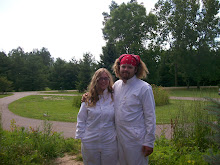Wednesday, June 17, 2009
Swarm season is over!
So bee's have a typical swarm season, which typically lasts from about May 15 to June 15, typically. So we are thinking that our first year of capturing feral swarms during their prime season has come to an end. All in all it was great! It was fascinating to see a feral swarm up close and to explore another chapter of beekeeping. We captured three feral swarms and one established colony in the past month, and two of the feral swarms and the established colony are still thriving. One captured swarm did vacate the hive and we did not relocate them. Often when bee's evacuate a hive to swarm, they do not stray very far from the parent hive. The queen is larger, and also full for laying brood, so it is more difficult for her to gain speed and altitude, as well as travel for long periods of time. But with no luck, we had to let that hive go and consider it a loss. There will always be more bee's, we will make sure of that!! So to date we have on record four Top Bar Hives, and eight Langstroth hives, for a glorious total of twelve colonies! I am eager to see the progress the hives make throughout the summer. We are daring to be a bit experimental with out bee's and are using a combination of Langstroth hives (Standard box hives) and Kenyan Top Bar Hives that Keith and I built ourselves. We built the top bar hives and constructed an observation window in one of them. We have bought as well as built our own Langstroth hives, and we choose to use a combination of standard hive frames and top bar frames. For more information on top bar hives, which I highly recommend should any of you choose to explore beekeeping, I prefer this site: http://bushfarms.com/beestopbarhives.htm. It gave us a lot of information about how to work with our traditional beekeeping knowledge and incorporate more natural ways to tend the bee's and give them a more suitable, less confining, habitat. It also gives you information on how you'll have to work differently handling the frames and extracting, information is not something you can ever have too much of. Learning of new ways to house the bee's and then to see their progress is amazing! Just look at what they create and you'll want them to be happy and productive! Because that's what it's really all about; making happy bee's!
Labels:
beekeeping,
langstroth hives,
swarm season,
top bar hives
Subscribe to:
Post Comments (Atom)





No comments:
Post a Comment